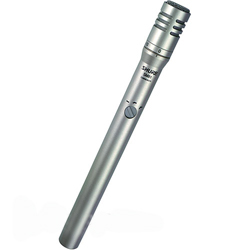Acoustic Guitar Mic
I see and hear this question quite a lot: what do you use for an acoustic guitar mic? That’s a great question, especially for people like me whose primary instrument is acoustic guitar.
I suppose the first question to ask back is to find out if the question refers to playing live or recording.
Trying to make an acoustic guitar heard on stage, especially if playing with an entire rock band, AND having it still sound decent, is another article by itself. For this article, I’ll just be talking about what mics are best to use when recording an acoustic guitar.
Condenser or Dynamic?
First off, let’s just forget about using dynamic mics for recording acoustic guitars (for a reminder of what a dynamic mic is versus a condenser mic, see our post here: What Is the Difference Between Condenser and Dynamic Microphones?). These instruments are capable of producing sound across a wide portion of the “hear-able” (by humans) spectrum, namely 20 Hz to 20,000 Hz.
Acoustic guitars also produce different types of sound, from the obvious strumming of the strings to using the wooden body as a drum, knocking and slapping it with your hand.
Add to that the variations on each of the above, such as whether the strings are strummed with a pick (from thin to thick – each gives a different sound) or with the thumb or fingers; or if picked rather than strummed, was that done using plastic finger picks or just the fingers? Was there a lot, a little, or no fingernail involvement? Then there is the style of music. Is it loud or soft? Is it rock or classical?
With so much variation in types of sound and expression, condenser mics are typically used for recording acoustic guitar. The main reasons for this are that condenser mics are better at picking up the high frequencies that acoustic guitars can produce, and they’re better at capturing “transients” (meaning very fast changes in level), which acoustic guitars also create in abundance, in the audio. Dynamic mics are better for electric guitar amps, which don’t produce as much transient detail.
Large or Small?
Whether to use a large diaphragm condenser (sometimes referred to by the acronym, “LDC”) or a small-diaphragm condenser mic is not as obvious. You may just want to experiment here. Personally, I’ve been using a small-diaphragm condenser mic, specifically the Shure SM81, for as long as I can remember to record all my acoustic guitar parts. I love how my guitars sound when recorded with one of these. I usually just put the microphone about 8-12 inches away from guitar, pointing at around the 12 fret, and hit the “record” button.
There are, of course, several different ways to record an acoustic guitar even once you’ve decide on what microphone to use. You can record with just one microphone to a mono track. Many folks like to record in stereo using two mics, each going to its own track. Even if you decide to record in stereo, there are several ways to do this. All these recording techniques for acoustic guitar make up a topic for an article all its own.
So to sum things up, I recommend using a small diaphragm condenser microphone, such as the Shure SM81, as your acoustic guitar mic of choice. However, a large diaphragm condenser mic can be a great choice as well. Your mileage may vary.
Cheers,
Ken

